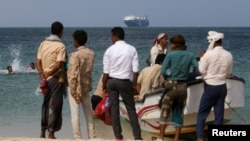Yemen's Houthi rebels have escalated attacks on ships passing through the Red Sea during the Israel-Hamas war, raising concerns about the impact on the flow of oil, grain and consumer goods through a major global trade artery.
Israeli-linked vessels have been targeted, but the threat to trade has grown as container ships and oil tankers flagged to countries such as Norway and Liberia have been attacked or drawn missile fire while traversing the waterway between Africa and the Arabian Peninsula. About 10% of the world's trade passes through the Red Sea.
In a sign of widening impact on global trade after a series of attacks or near-misses this week, Maersk, the world’s biggest shipping company, said Friday that it has told all of its vessels due to pass through a maritime chokepoint in the southern Red Sea to “pause their journey until further notice.”
German-based shipper Hapag-Lloyd, which was operating a vessel attacked Friday, also said it was pausing all its container ship traffic through the Red Sea until Monday. MarineTraffic, a vessel tracking firm, showed plenty of ships still moving through the region.
Here are things to know about the recent attacks and the impact on global shipping:
Who is attacking ships in the Red Sea and why?
The Houthis are Iranian-backed rebels who swept down from their northern stronghold in Yemen and seized the capital, Sanaa, in 2014, launching a grinding war against a Saudi-led coalition seeking to restore the government.
The Houthis have sporadically targeted ships in the region, but the attacks have increased since the start of the Israel-Hamas war.
They have used drones and anti-ship missiles to attack vessels and in one case used a helicopter to seize an Israeli-owned ship and its crew.
They have threatened to attack any vessel they believe is either going to or coming from Israel. That's now escalated to apparently any vessel given recent attacks, with the Houthis also hailing vessels by radio to try to convince them to change course closer to the territory they control.
"The numerous attacks originating from Houthi-controlled territories in Yemen threaten international navigation and maritime security, in grave contravention of international law," the European Union foreign policy office said.
Why is the Red Sea Important?
The Red Sea has the Suez Canal at its northern end and the narrow Bab el-Mandeb Strait at the southern end leading into the Gulf of Aden. It's a busy waterway with ships traversing the Suez Canal to bring goods between Asia and Europe.
A huge amount of Europe's energy supplies, including oil and diesel fuel, come through that waterway, said John Stawpert, senior manager of environment and trade for the International Chamber of Shipping, which represents 80% of the world's commercial fleet.
So do food products such as palm oil and grain, as well as anything else brought over on container ships, which is most of the world's manufactured products.
How are Houthi attacks affecting trade?
Some Israeli-linked vessels have apparently started taking the longer route around Africa and the Cape of Good Hope, said Noam Raydan, senior fellow at the Washington Institute for Near East Policy. That lengthens the trip from around 19 days to 31 days depending on vessel speed, increasing costs and adding delays, she said.
The global oil market has shrugged off the most recent attacks. Prices have fallen, and the market is more worried about weak demand in major economies.
The single biggest immediate impact of the Houthi escalation has been increased insurance costs.
Recent attacks show the increased threat to vessels in the Red Sea represent a "significant impediment" to commercial shipping in the region, said Munro Anderson, head of operations for Vessel Protect, which assesses war risks at sea and provides insurance with backing from Lloyd's, whose members make up the world's largest insurance marketplace.
There is "a further degree of instability facing commercial operators within the Red Sea which is likely to continue to see heightened rates across the short to medium term," he said.
Insurance costs have doubled for shippers moving through the Red Sea, which can add hundreds of thousands of dollars to a journey for the most expensive ships, said David Osler, insurance editor for Lloyd's List Intelligence, which provides analysis for the global maritime industry.
For Israeli ship owners, they have gone up even more — by 250% — and some insurers won't cover them at all, he said.
While shippers are applying a so-called war risk charge of $50 to $100 per container to customers bringing over everything from grain to oil to things you buy off Amazon, that's a low enough fee that it should not drive up prices for consumers, he said.
Osler expects insurance costs to keep rising but said the situation would have to get a lot worse — such as the loss of several ships — to raise prices considerably and make some ship owners rethink moving through the region.
"At the moment, it's just an inconvenience that the system can handle," he said. "Nobody likes to be paying hundreds of thousands of dollars more, but you can live with it if you have to."
Could the Houthis block the Red Sea?
Unlikely, experts say. The Houthis have no formal naval warships with which to impose a cordon, relying on harassing fire and only one helicopter-borne assault so far. Meanwhile, U.S., French and other coalition warships patrol the area, keeping the waterway open.
Still, the attacks are making the shipping industry nervous, and "it's not being taken lightly," said Stawpert of the shipping chamber. But "you'll still see there's an awful lot of trade going through the Red Sea because it's such a crucial supply line for Europe and Asia."
He noted that the Houthis' area of influence in the waterway also remains limited.
"I just don't see there being a possibility of the Houthis shutting transport through the Red Sea," he said. It is "simply not how the shipping industry works. It's not how we respond to threats like this. We will do everything we can to mitigate any such threats and keep trade flowing."
That's been on display in other conflicts, such as the war in Ukraine's closure of some parts of the Black Sea, Stawpert said.
He doesn't see a threat to shipping in general or closure of Red Sea routes, but "if that were to arise as a potentiality, I think we would see a much more robust reaction from navies in the area."








